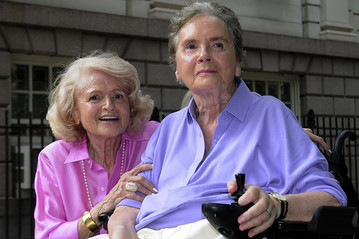Everyone is waiting with bated breath to see if and how the New York marriage equality victory will impact the progress of marriage in other states and even on a federal level. Today we may have gotten a preview. New York Attorney General Eric Schneiderman filed a “friend of the court” brief supporting the ACLU in their opposition of DOMA. (Read a PDF of the brief here.)
Schneiderman isn’t the first to do this; Martha Coakley, Massachusetts Attorney General, also filed a lawsuit against Section 3 of DOMA (the same section that Obama has declared unconstitutional) back in 2009. Aside from acknowledging the unconstitutional and discriminatory aspects of DOMA, Coakley also argued that DOMA “undermined states’ efforts to recognize marriages between same-sex couples,” effectively bringing the argument into the realm of states’ rights. While the hurtful, discriminatory effects of DOMA feel more important to our day-to-day lives, a states’ rights argument might be the most effective way to end it. Box Turtle Bulletin explains how DOMA violates states’ rights, and what New York’s suit has to do with it. (Read the whole thing if you can – it’s very helpful.)
It presumes, in paragraph 3, that the federal government holds veto power over marriage and can – for any matter that impacts any federal program – replace the state’s criteria with its own. If the marriage criteria in Vermont doesn’t meet the approval of the Senator from Alabama or the Congressman from Mississippi, then by securing a bare majority of fellow legislators they can dictate to Vermont which of its citizens can be considered married for Social Security, taxation, and health care, and which are deemed by Alabama and Mississippi to be unworthy.
While the DoJ has already declared that it will no longer defend DOMA in court, and the recent hearing on the Respect for Marriage Act seemed to indicate pretty conclusively that the anti-gay side doesn’t have much of a leg to stand on, this brief still won’t end DOMA on its own. Ultimately, that will probably need to wait for the Supreme Court’s decision. What it does instead is is lend weight to the forces already aligned against it — as Pam’s House Blend says, “the weight of yet another major state objecting to DOMA may be too much for this discriminatory law to bear.”
New York’s court brief will support Windsor vs. United States, the lawsuit filed by the ACLU and Edith Windsor, the 81-year-old widow of her partner of 44 years, Thea Spyer. They married in Canada in 2007. Hers is one of the suits in which the DoJ has refused to continue defending DOMA, ceding her the ethical if not legal victory. With the support of New York and the President and hopefully others as well, maybe she will finally get the justice she’s looking for.









